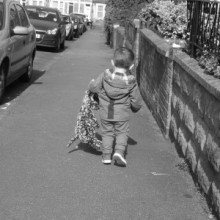Child poverty rates in Bournemouth are one of the worst in the country, as over 6,000 children now live below the relative poverty threshold.
Reducing child poverty is a vital part of improving the lives of thousands of disadvantaged children across Britain as the national average hits a high of 20%.
It is believed that 27% of all children in the UK live in households where the income is beneath the poverty line— whether the family is socially, relatively or monetary deprived.
The Coalition Government has therefore reiterated its commitment to eradicating child poverty by 2020, as part of their 10 year plan of minimising welfare cuts to families and by introducing local community projects.
Recent estimates from the Child Poverty Action Group, suggest that 19% of families in Bournemouth are having to make strict decisions on how to divide their income in order to provide for their children.
For the past three years, Bournemouth Borough Council has decided to freeze its council tax rate in order to allow householders to adapt to the ever-changing economic climate. However, despite them putting aside 11% of their gross expenditure on children’s services, not including education, some areas of the Borough have seen a shockingly high increase in the rate of child poverty, surpassing the national average.
Bournemouth’s statistics
Government statistics show that wards such as Kinson South (33%), Boscombe West (32%) and Springbourne (32%) have some of the highest rates in the country and this is set to get worse with the reduction of housing benefits to thousands of low-income households.
Labour Cllr Ben Grower, represents Kinson South and believes the council are making the issue even worse. He said: “The council can’t decide what action to take let alone how to assess how big the problem is or can be.
“Austerity measures are not solving the problems we have; it is actually making them worse. Bournemouth is a white collar area, therefore the council never encourage businesses to employ local people. This means families have to choose between feeding their children and clothing them.”
It is undoubtedly evident that local authorities such as Bournemouth Borough Councilare having to face inevitable cuts from central Government, but as Kate Bell, London Campaign Co-Ordinator for the Child Poverty Action Group argues, it is essential that together they uphold their commitments to the Child Poverty Act 2010 outlining the eradication of the problem.
She said: “The sheer scale of child poverty in this country compared to other EU countries, who have much lower rates, is frightening. We still need to go a far way to achieve anything and we need to implement changes now to do so, which is the shared responsibility of councils and the Government.”
Child poverty prevention
In Bournemouth, the 2026 Partnership Trust aims to focus on helping families and communities in Boscombe and West Howe, two key areas identified as requiring a combined partnered approach between the local community and businesses to tackle difficult social problems.
Despite the partnerships’ Troubled Families programme being implemented in these areas to combat child poverty and having a positive effect, the council are yet to retain a set amount of funding to eliminate this ever-increasing issue.
For a taxpayer in Bournemouth, the annual cost of children’s services based on a Band D property, is £165 which is then divided between the necessary bodies of the council including children’s social care and the Safeguarding Board.
Cllr Jane Kelly, representative of Boscombe West is confident that the council will provide support to vulnerable families as best as it is able to but said: “welfare reform do put a strain on local Council resources …it just means that eradicating poverty is a part of everyday business.”
The underlying issue of child poverty is in the media spotlight and a report published by the think tank, Policy Exchange, argues that politicians and council leaders across the country are only increasing certain benefits to those who are not in work, just to simply push them above the poverty line, rather than eliminating the problem at hand.
With the aim of succeeding their goal of reducing child poverty by 2020, it is believed that meeting the headline target would cost around £19 billion a year of central Government expenditure.
It is thought by many, that local authorities such as Bournemouth Council will eventually have to increase council tax rates as well as decrease the amount of services available to children and families living below the poverty line in order to bridge this financial gap.
The definition of child poverty has been modified several times by Parliament but in accordance with the Child Poverty Act 2010 it is now defined as children living in a family who receive out-of-work benefits, or in-work tax credits, where the income is less than 60 per cent of median income.
This article first appeared in buzzbournemouth.ac.uk







